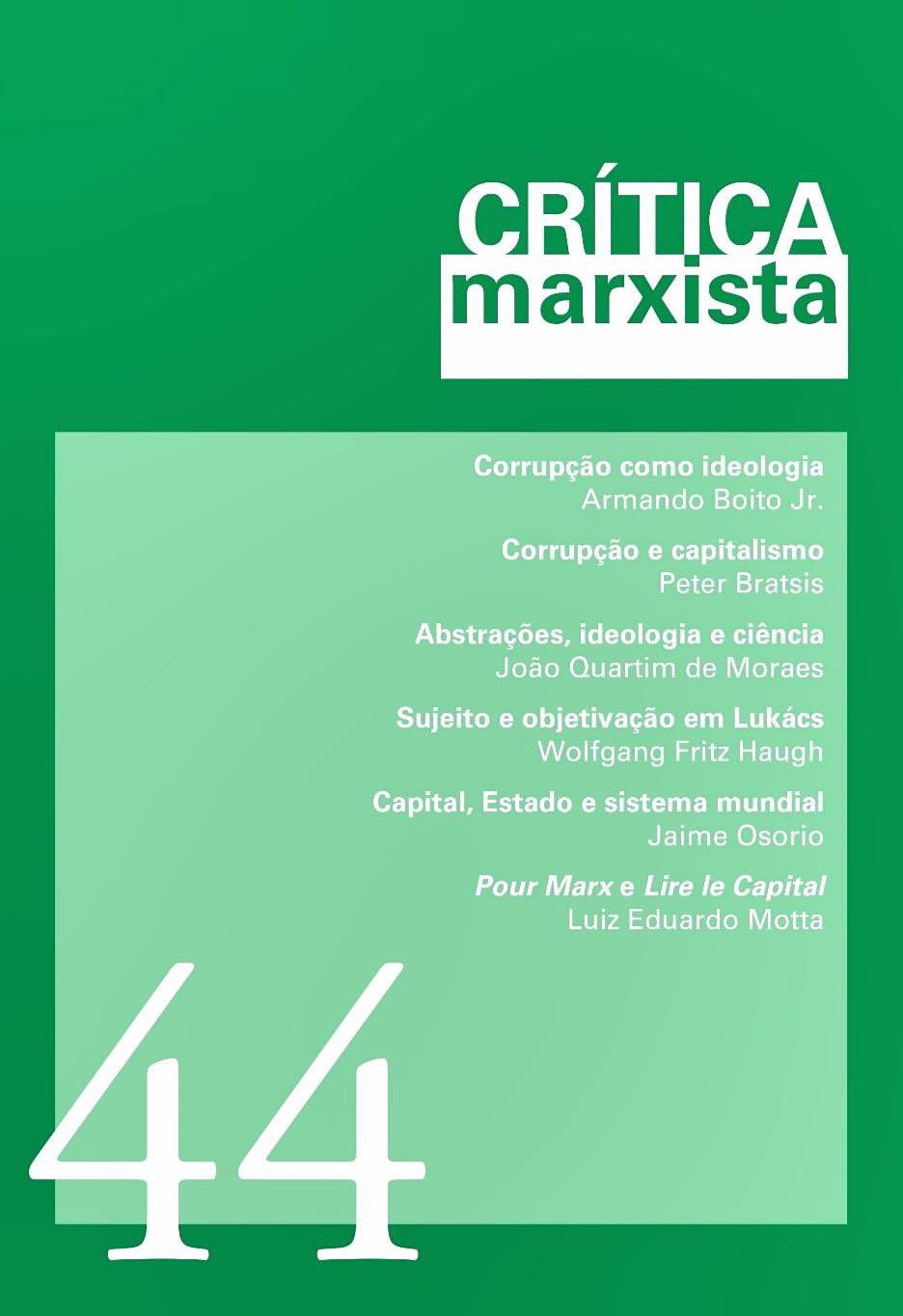Resumo
O movimento anticorrupção, surgido no início da década de 1990, e sempre em crescimento desde então, demonstrou ter importância considerável na forma como entendemos e explicamos as desigualdades globais, bem como na redefinição de corrupção como falta de transparência. Este trabalho analisa o ritmo e o conteúdo desse movimento. Seu argumento é que, após o colapso da União Soviética e o aprofundamento de um capitalismo cada vez mais transnacional, o discurso anticorrupção surgiu como uma nova versão do “fardo do homem branco”, uma justificativa para a intervenção em políticas internas de Estados mais fracos, assim como a explicação para sua relativa pobreza. Ao mesmo tempo, o movimento anticorrupção tem funcionado para pressionar os Estados no sentido de aumentar sua autonomia com relação aos interesses e frações dos capitais locais, a fim de tornar esses Estados mais subservientes e hospitaleiros ao capital transnacional como um todo.
Referências
AHRENS, F. Greek Debt: Bailout Concessions Not Nearly Spartan Enough. The Washington Post, 3 maio 2010. Disponível em: <http://voices.washingtonpost.com/economywatch/2010/05/greek_debt_bailout_concessions.html>
BACHELARD, G. The Psychoanalysis of Fire. Boston: Beacon Press, 1964.
BADIOU, A. The Meaning of Sarkozy. Londres: Verso, 2008.
BRATSIS, P. The Construction of Corruption or Rules of Separation and Illusions of Purity in Bourgeois Societies. Social Text, 9 (4), 2003, p.9-33.
BRATSIS, P. Everyday Life and the State. Boulder: Paradigm Publishers, 2006.
BUKOVANSKY, M. The Hollowness of Anti-Corruption Discourse. Review of International Political Economy, 13 (2), 2006, p.181–209.
EIGEN, P. Removing a Roadblock to Development: Transparency International Mobilizes Coalitions Against Corruption. Innovations, 3 (2), 2008, p.19-33.
EUROSTAT. Statistics in Focus: Population and Social Conditions. 2007. Disponível em: <http://epp.eurostat.ec.europa.eu/cache/ITY_OFFPUB/KS-SF-07-097/EN/KSSF-07-097 EN.PDF>
FRANCIS, D. Greece Is Not a Country, It’s a Party. The Huffington Post, 8 jun. 2011. Disponível em: <http://www.huffingtonpost.com/diane-francis/greece-is-notacountry-i_b_871296.html>
HEIDENHEIMER, A.; JOHNSTON, M.; LEVINE, V. Terms, Concepts and Definitions: an Introduction. In: HEIDENHEIMER, A.; JOHNSTON, M.; LEVINE, V. (orgs.). Political Corruption: a Handbook. New Brunswick: Transaction Publishers, 1989.
HINDESS, B. Investigating International Anti-Corruption. Third World Quarterly, 26 (8), 2005, p.1389-98.
HUNTINGTON, S. Political Order in Changing Societies. New Haven: Yale University Press, 1968.
JESSOP, B. Globalization and the Capitalist State. In: ARONOWITZ, S.; BRATSIS, P. (Orgs.). Paradigm Lost: State Theory Reconsidered. Minneapolis: University of Minnesota Press, 2002.
JOHNSTON, M. The New Corruption Rankings: Implications for Analysis and Reform. Paper apresentado no encontro anual da International Political Science Association, 2000.
KAUFMANN, D.; WEI S.-J. Does “Grease Money” Speed up the Wheels of Commerce? IMF Working Paper, n.2064, 2000.
KOWALCZYK, A. M. The Transnational and the Domestic: the Case of Neoliberal Restructuring in Chile (1973–1989). Dissertação, University of Salford, Manchester, 2012.
LACAN, J. Ecrits. Nova York: W.W. Norton, 2005.
LAMBSDORFF, J. G. The Institutional Economics of Corruption and Reform: Theory, Evidence and Policy. Cambridge: Cambridge University Press, 2007.
LAPAVITSAS, C. et al. Crisis in the Eurozone. Londres: Verso, 2012.
LARMOUR, P.; WOLANIN, N. Introduction. In: LARMOUR, P.; WOLANIN, N. (Orgs.). Corruption and Anticorruption. Camberra: Asia Pacific Press, 2001.
MARIOS, T. From the Economic Crisis to a “State” of Crisis? The Emergence of Neoliberalism in Costa Rica. Historical Materialism, 13 (3), 2005, p.101-134.
MAURO, P. Corruption and Growth. The Quarterly Journal of Economics, 110 (3), 1995, p.681-712.
MILIBAND, R. The State in Capitalist Society. Nova York: Basic Books, 1969.
OLSON, M. The Rise and Decline of Nations: Economic Growth, Stagflation, and Social Rigidities. New Haven: Yale University Press, 1982.
PANITCH, L.; GINDIN, S. The Making of Global Capitalism: the Political Economy of American Empire. Londres: Verso, 2012.
POULANTZAS, N. Political Power and Social Classes. Londres: New Left Books, 1973.
POULANTZAS, N. Classes in Contemporary Capitalism. Londres: New Left Books, 1975.
POULANTZAS, N. State, Power, Socialism. Londres: New Left Books, 1978.
PRZEWORSKI, A.; TEUNE, H. The Logic of Comparative Social Inquiry. Nova York: John Wiley & Son, 1970.
ROBINSON, W. I. A Theory of Global Capitalism: Production, Class, and State in a Transnational World. Baltimore: Johns Hopkins University Press, 2004.
ROSE-ACKERMAN, S. Corruption and Government: Causes, Consequences, and Reform. Cambridge: Cambridge University Press, 1999.
SMITH, A. The Wealth of Nations. Hollywood, FL.: Simon and Brown Publishers, 2010.
TANZI, V. Corruption around the world. IMF Staff Papers, 45 (4), 1998, p.559-94.
TSOUKALAS, K. The Deregulation of Morals: the Ultimate Phase of Globalized Capitalism. Situations, 4 (2), 2012, p.5-36.
TSOUKALAS, K.; KAFETZIS, T. On Political Corruption. Greek Political Science Review, 31, 2008, p.5-49.
WEBER, M. Economy and Society. Berkeley: University of California Press, 1978.
WEI, S.-J. Why is Corruption So Much More Taxing than Tax? Arbitrariness Kills. National Bureau of Economic Research, Working Paper n.6030, 1997.
WEI, S.-J. Corruption in Economic Development: Beneficial Grease, Minor Annoyance, or Major Obstacle? The World Bank, Policy Research Working Paper n.2048, 1999.

Este trabalho está licenciado sob uma licença Creative Commons Attribution 4.0 International License.
Copyright (c) 2017 Peter Bratsis
